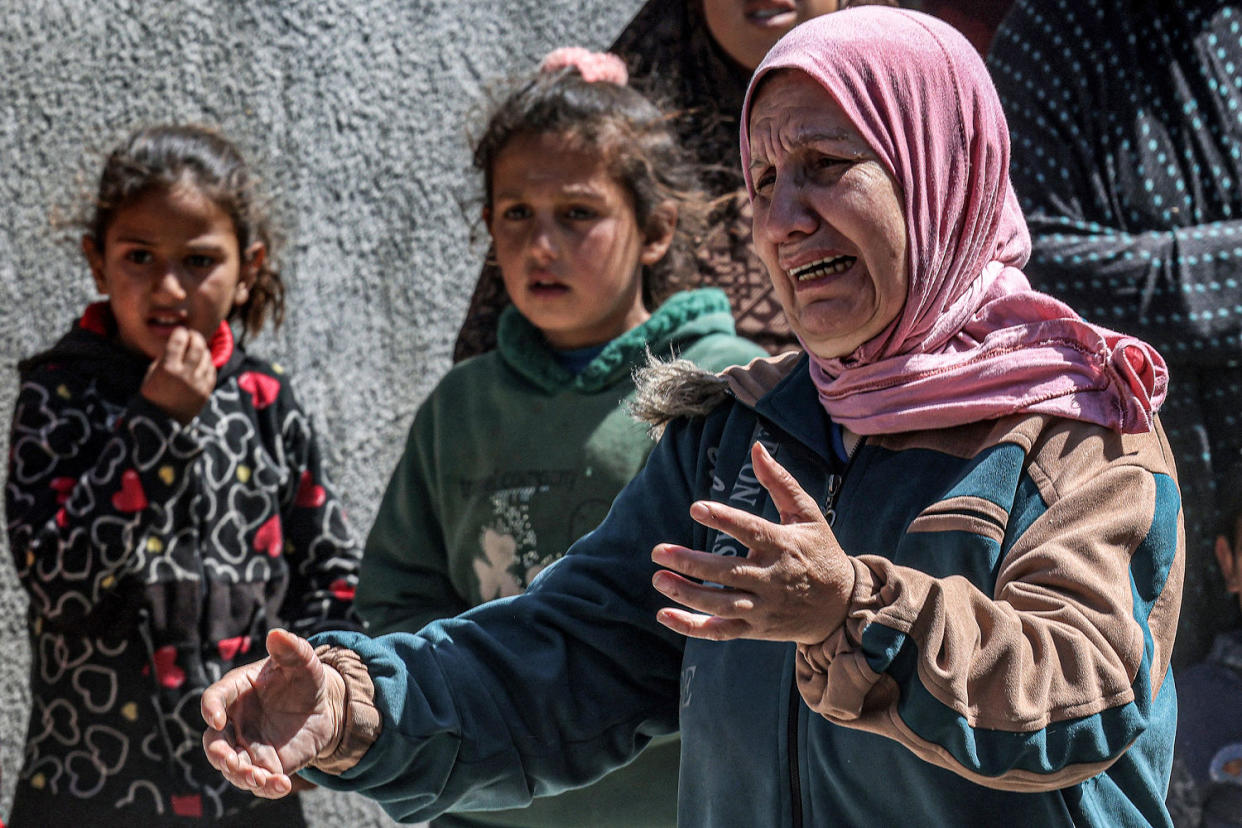Gazans increasingly back a two-state solution, as support for Hamas drops
Support for Hamas as a political party has fallen to 34% among Palestinians in Gaza and the occupied West Bank, a 12-point drop from December 2023, according to a poll released Wednesday by a leading Palestinian research institute.
While the war is eroding Palestinians’ view of Hamas as the governing body in Gaza, relative support remains high for the militant group’s role in the war. Seventy percent of Palestinians said they were “satisfied” with Hamas’ war performance, as compared to that of other Palestinian entities, like its political rival Fatah, whose deeply unpopular leader, Mahmoud Abbas, governs the West Bank. Hamas’ Oct. 7 attack triggered the war with Israel, which has so far killed more than 31,000 people in Gaza, according to the enclave’s health ministry.
The poll was conducted in-person, from March 5 to March 10, at the start of the fifth month of the war, with a sample size of 1580 — 830 of those polled lived in the West Bank and 750 in the Gaza Strip — by the Palestinian Center for Policy and Survey Research (PSR), an independent survey organization based in Ramallah that has surveyors across Gaza. The center has measured public opinion in the Palestinian territories quarterly since the 1990s.
In the period leading up to the poll, Israeli forces had advanced into central Gaza, fears were high of a military incursion into Rafah, the southern city where some 1.5 million people are sheltering, the humanitarian crisis had hit new lows as the most vulnerable began dying of starvation, and negotiations for a cease-fire before Ramadan were sputtering but still offered a fading glimmer of hope.
Opinions in the West Bank and Gaza diverged significantly on the issue of support for Hamas as a political party. Hamas has governed Gaza since 2007, while Abbas of Fatah runs the West Bank. Unlike Gazans, Palestinians in the West Bank are not subject to the extreme hostilities of the war.
Before the war, in September 2023, only 12% of Palestinians in the West Bank supported Hamas. By that December, as the war entered its third month, support for Hamas in the West Bank skyrocketed to 44%, before falling to 35% in March. Support has been less volatile in Gaza, where 38% supported Hamas in September 2023, 42% in December 2023, and 34% this month.
Support for Fatah has also dropped, from 26% in September 2023, to 17% this March. The decline was largely driven by a loss of support among West Bank Palestinians, with the majority calling for Abbas to resign and Fatah to be dissolved.
Unlike in previous flare-ups of violence between Palestinians and Israelis — when support for armed struggle often spiked before dropping again — the length and brutality of the current war has led to significant shifts in the way Palestinians, particularly Gazans, viewed warfare versus diplomatic solutions.
Support for “armed struggle” dropped by 17 points, from 63% to 46%, driven largely by Palestinians in Gaza, and Gazan support for a diplomatic two-state solution has jumped by 27 points — to 62%.
“Generally speaking, when there is greater exposure to violence by Palestinians the immediate reaction — that is temporary but is immediate — is the rise in support for violence. This is true in every single survey we have done,” Khalil Shikaki, who founded and runs PSR, told NBC News in a telephone interview from Ramallah.
But this time that wasn’t the case. “In the November-December 2023 poll, support for Hamas and armed struggle was probably associated with Hamas’ success in releasing Palestinian women and children from Israeli jails demonstrating the efficacy of armed struggle,” he said, referring to the center’s previous poll, which was taken in part during the seven-day truce in which Palestinian detainees were exchanged for some Israeli hostages.
“This current poll was conducted under very different conditions,” Shikaki said, including the “endless human suffering” Gazans are facing. Nearly 80% of Gazans reported that at least one family member had been killed or injured, and much of the population is at risk of imminent famine.

The divergence between support for Hamas as a political party, which is dropping, and for its role in the war, which is steady at 70%, is indicative of its dual role as an administrative governing body and as a symbol for the decadeslong Palestinian resistance against Israeli occupation.
Hamas, which for decades has resorted to violent tactics like suicide bombings on Israeli civilian targets and is deemed a terrorist organization by the U.S., has long been divisive among Palestinians. In recent years, as progress on a two-state solution and peace talks dwindled, Hamas-affiliated attacks seemingly put the Palestinian plight on the global agenda, gaining Palestinian support and allowing it to fill a power vacuum.
Satisfaction among Palestinians with the United States’ handling of the war is nearly nonexistent at 1%, backing up diplomatic warnings that anti-U.S. sentiment is festering in the Arab world. As a regional actor, Yemen had the highest approval ratings, due to the Houthis, the rebel group that has been attacking commercial shipping vessels in the Red Sea in what they have framed as solidarity with the Palestinian cause.
Face-to-face polling in a war zone comes with severe risks. Sampling took place in several dozen shelters in the cities of Rafah, Khan Younis and Deir El-Balah. The center did not assign pollsters to parts of southern and central Gaza where Israeli tanks are stationed. Despite having field researchers in Gaza City, it remains too dangerous for PSR to deploy a polling force there, Shikaki added.
“There are limits to where we will go,” he said. “We are sampling the shelters, for those who have moved from north to south. That way, we are essentially covering everybody.”
